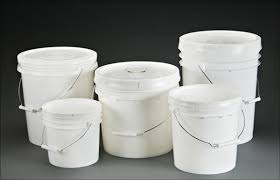Use and Applications of the Quintessential Plastic Pail
Posted by on June 28, 2013
Over the years building materials and solvents have been packaged in large metal pails but in recent decades plastic buckets have been greatly preferential. Plastic pail has more uses due to the popularity of plastic for food products in comparison with metal pails that have a tendency to rust and plastic pails are lower in weight.

A container typically cylindrical in shape and having a handle generally used for carrying liquids is called a pail. Pails can be made of steel, tinplate, aluminum, fiber, paperboard and plastics. They are either open-headed with removable covers or are tight headed with sealed heads and a screw closure.
Pails are used for a carrying a variety of fluids and flowing materials. When accurately constructed and certified, they may be used for perilous goods shipments.
Advantages of Plastic Pails
Plastic pails offer abundant advantages for various applications:
- Will not corrode or dent. It helps make your product last longer.
- Flawless as it is molded in one piece with no joints that can leak in transportation or storage.
- It is considerably lighter in weight than steel pails, resulting in reduced shipping costs.
- The tapering design of plastic pails allows them to be nested for storage and transport prior to filling.
- It is a tested and proven material for over 35 years and a safe, cost effective and dependable package for a wide array of solid and liquid products.
- Characteristics that are built into the cover offer added stability and endurance while storing and transporting.
- Can carry wide range of capacities ranging from 1 gallon (3.785 Liters) to 6 gallons (22.7 Liters).
- Re-sealable closures and fitting designs enable spill free dispensing and trustable resealing for all types of products.
- Purchasing a good quality plastic pail ensures use of designs that are approved by the UN/DOT and FDA regulations. This is especially important when you are transporting dangerous materials and food grade applications
- It has user friendly handling and dispensing methods.
- It emits less noise during filling and closing.
- Plastic pails can be personalized to provide the best performance for better use of . This helps protect your items from environmental stresses, crack resistance, resistance to product penetration and compressive potency.
- A wide variety of existing closures and cover gasket materials guarantees optimum compatibility with your product.
- Plastic pails can be colored or surface treated to provide your product with the UV protection required.
- Plastic pails have a huge and smooth surface that allows for placement of high quality text and graphics.
Applications of Plastic pail
Plastic pail manufacturers typically offer products in tight head or open head configurations that are available in a variety of colors and wall thicknesses for various applications like food processing, the dairy, oil industries and industrial and chemical use.
Plastic pail manufacturers have been manufacturing worldwide for every application and occasion even on a retail level.
- Plastic pails for Parties
Fashionable pitchers, ice buckets, colorful trays, bowls, tubs, mini and bright boxes and buckets are available which favors for party.
- Plastic Pail for Kids
Apart from party supplies, the plastic pails can be used for beach pails and as sand toys.
- Plastic Pail for Craft
There are various mini white plastic pails available for craft supplies like knitting project, small toys, and as decorative items.
- Plastic Pail for Paints
Plastic pail can be used for supplies carrying paints and sprayers, adhesives, grease containers etc.
- Plastic Pail for Food storage
Storing food in heavy plastic helps keep enemies out of food such as pests, moisture, light and oxygen. A mylar bag acts as a liner providing a double layer of protection for the food. People store dry goods, such as wheat, rice, beans and cornmeal in buckets.
Can plastic pails be recycled?
Plastic pails have a proven track record as simply re-useable and recyclable. Most plastics can be recycled though care is needed. The main hitch is that plastics cannot be mixed and therefore they need sorting out before the recycling process can take place.
Common applications of pail are storage of food and dairy, grout, wall joint, pet food, bird seed, vegetable oils, detergent, inks, paint, adhesives, cleaning products, food products and other industrial products.
If you plan on using same containers of what you have stored in buckets, invest a few dollars more in Gamma Seal Lids. These lids allow for easy access to food and yet provide an air-tight seal when closed and can be used for longer time. Thus plastic pails are more favorable for all seasons, all types of products and have a longer shelf life.
Recent Comments